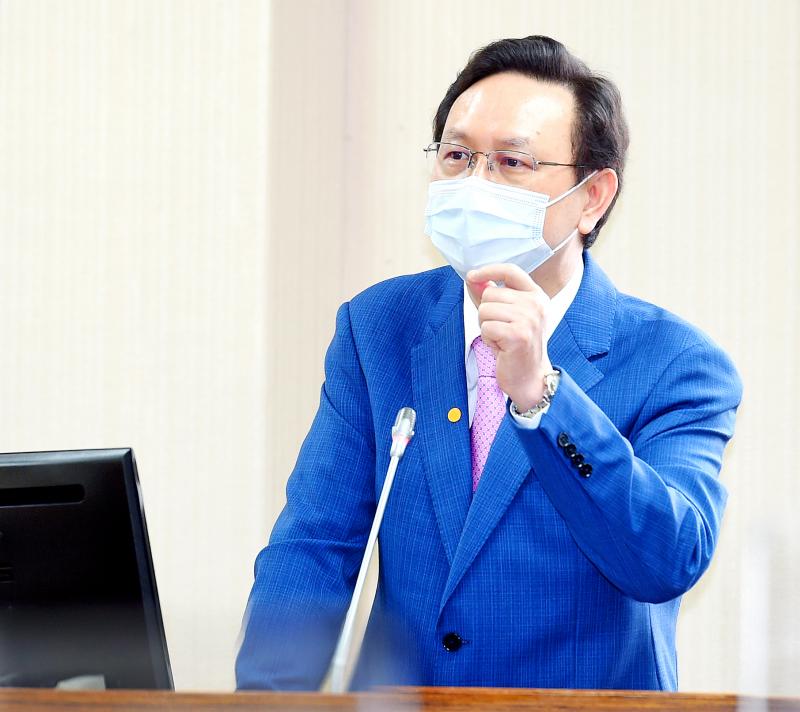Chinese attempts to influence overseas communities has “never ceased,” even as Taiwan seizes opportunities to expand its educational reach abroad, Overseas Community Affairs Council Minister Tung Chen-yuan (童振源) said yesterday, while urging continued vigilance against Beijing’s “united front” campaigns.
Speaking at a regular meeting of the legislature’s Foreign Affairs and National Defense Committee, Tung discussed China’s recent “united front” efforts abroad.
Beijing has been revealing its ambition to endanger the global order through authoritarianism, he said, citing its deliberate concealment of COVID-19 at the beginning of the outbreak in Wuhan in 2019, crackdowns in Xinjiang and Hong Kong, and sabotage of cross-strait relations, as well as infiltration of academia through its Confucius Institutes.

Photo: Chu Pei-hsiung, Taipei Times
These actions have deepened distrust of China among global democracies such as Australia, the UK and the US, and countries in Europe, which have been shutting the institutes down in droves, he said.
Various high-level government officials and international organizations have reiterated the importance of stability in the Taiwan Strait and Indo-Pacific region — including the Quadrilateral Security Dialogue and the AUKUS security alliance of Australia, the UK and the US — underscoring their deep concern for Taiwan’s strategic value, he said.
Amid such international support, Taiwan has more opportunities to promote Chinese-language education and connect with overseas communities in the US and Europe, Tung said.
However, Tung also called for vigilance against unceasing “united front” attempts to influence overseas communities.
The nation has been taking advantage of countries’ closing their Confucius Institutes to expand its own educational reach abroad, making effective use of Taiwan’s advanced educational technologies and quality instruction, Tung said.
By the end of March, the council had helped establish 45 Taiwan Centers for Mandarin Learning in the US and Europe, he said.
Overseas communities have also expressed their support of Taiwan by promoting the nation’s involvement in international organizations, Tung added.
For example, 163 events were held in 43 regions last year calling for Taiwan’s participation in the World Health Assembly, with participation from 800 organizations and 17,055 people, he said.
In North American alone, 41 events involving 316 overseas community groups and 6,000 participants called for Taiwan’s inclusion in the UN, he added.
After the nation on Sept. 22 last year officially applied to join the Comprehensive and Progressive Agreement for Trans-Pacific Partnership, the World Taiwanese Chambers of Commerce also established a working group to promote Taiwan’s inclusion, Tung said, touting the examples as confirmation of a deep passion for Taiwan among its overseas communities.

An essay competition jointly organized by a local writing society and a publisher affiliated with the Chinese Communist Party (CCP) might have contravened the Act Governing Relations Between the People of the Taiwan Area and the Mainland Area (臺灣地區與大陸地區人民關係條例), the Mainland Affairs Council (MAC) said on Thursday. “In this case, the partner organization is clearly an agency under the CCP’s Fujian Provincial Committee,” MAC Deputy Minister and spokesperson Liang Wen-chieh (梁文傑) said at a news briefing in Taipei. “It also involves bringing Taiwanese students to China with all-expenses-paid arrangements to attend award ceremonies and camps,” Liang said. Those two “characteristics” are typically sufficient

A magnitude 5.9 earthquake that struck about 33km off the coast of Hualien City was the "main shock" in a series of quakes in the area, with aftershocks expected over the next three days, the Central Weather Administration (CWA) said yesterday. Prior to the magnitude 5.9 quake shaking most of Taiwan at 6:53pm yesterday, six other earthquakes stronger than a magnitude of 4, starting with a magnitude 5.5 quake at 6:09pm, occurred in the area. CWA Seismological Center Director Wu Chien-fu (吳健富) confirmed that the quakes were all part of the same series and that the magnitude 5.5 temblor was

The brilliant blue waters, thick foliage and bucolic atmosphere on this seemingly idyllic archipelago deep in the Pacific Ocean belie the key role it now plays in a titanic geopolitical struggle. Palau is again on the front line as China, and the US and its allies prepare their forces in an intensifying contest for control over the Asia-Pacific region. The democratic nation of just 17,000 people hosts US-controlled airstrips and soon-to-be-completed radar installations that the US military describes as “critical” to monitoring vast swathes of water and airspace. It is also a key piece of the second island chain, a string of

The Central Weather Administration has issued a heat alert for southeastern Taiwan, warning of temperatures as high as 36°C today, while alerting some coastal areas of strong winds later in the day. Kaohsiung’s Neimen District (內門) and Pingtung County’s Neipu Township (內埔) are under an orange heat alert, which warns of temperatures as high as 36°C for three consecutive days, the CWA said, citing southwest winds. The heat would also extend to Tainan’s Nansi (楠西) and Yujing (玉井) districts, as well as Pingtung’s Gaoshu (高樹), Yanpu (鹽埔) and Majia (瑪家) townships, it said, forecasting highs of up to 36°C in those areas